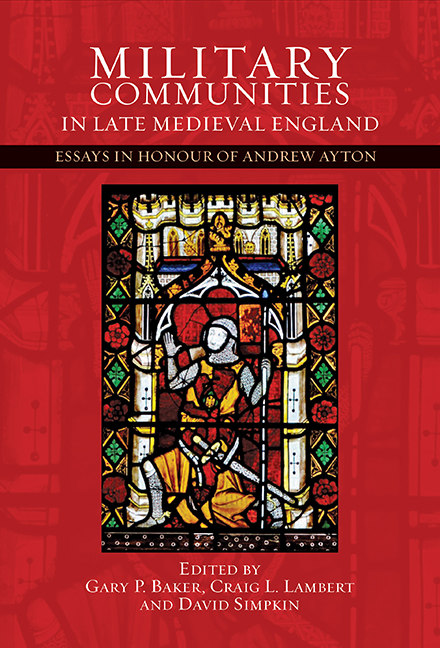Book contents
- Frontmatter
- Miscellaneous Frontmatter
- Contents
- List of Illustrations
- Acknowledgements
- List of Contributors
- Foreword
- Andrew Ayton: A Brief Tribute
- Andrew Ayton: A Recognition of his Work
- Abbreviations
- Part Title
- 1 ‘Big and Beautiful’. Destriers in Edward I's Armies
- 2 Cum Equis Discoopertis: The ‘Irish’ Hobelar in the English Armies of the Fourteenth Century
- 3 Andrew Ayton, the Military Community and the Evolution of the Gentry in Fourteenth-Century England
- 4 Knights Banneret, Military Recruitment and Social Status, c. 1270–c. 1420: A View from the Reign of Edward I
- 5 Sir Henry de Beaumont and His Retainers: The Dynamics of a Lord's Military Retinues and Affinity in Early Fourteenth-Century England
- 6 Financing the Dynamics of Recruitment: King, Earls and Government in Edwardian England, 1330–60
- 7 The Symbolic Meaning of Edward III's Garter Badge
- 8 Sir Robert Knolles’ Expedition to France in 1370: New Perspectives
- 9 The Organisation and Financing of English Expeditions to the Baltic during the Later Middle Ages
- 10 Naval Service and the Cinque Ports, 1322–1453
- 11 The Garrison Establishment in Lancastrian Normandy in 1436 according to Surviving Lists in Bibliothèque Nationale de France manuscrit français 25773
- Bibliography of the Writings of Andrew Ayton
- Index
- Tabula Gratulatoria
- Warfare in History
10 - Naval Service and the Cinque Ports, 1322–1453
from Part Title
Published online by Cambridge University Press: 17 July 2019
- Frontmatter
- Miscellaneous Frontmatter
- Contents
- List of Illustrations
- Acknowledgements
- List of Contributors
- Foreword
- Andrew Ayton: A Brief Tribute
- Andrew Ayton: A Recognition of his Work
- Abbreviations
- Part Title
- 1 ‘Big and Beautiful’. Destriers in Edward I's Armies
- 2 Cum Equis Discoopertis: The ‘Irish’ Hobelar in the English Armies of the Fourteenth Century
- 3 Andrew Ayton, the Military Community and the Evolution of the Gentry in Fourteenth-Century England
- 4 Knights Banneret, Military Recruitment and Social Status, c. 1270–c. 1420: A View from the Reign of Edward I
- 5 Sir Henry de Beaumont and His Retainers: The Dynamics of a Lord's Military Retinues and Affinity in Early Fourteenth-Century England
- 6 Financing the Dynamics of Recruitment: King, Earls and Government in Edwardian England, 1330–60
- 7 The Symbolic Meaning of Edward III's Garter Badge
- 8 Sir Robert Knolles’ Expedition to France in 1370: New Perspectives
- 9 The Organisation and Financing of English Expeditions to the Baltic during the Later Middle Ages
- 10 Naval Service and the Cinque Ports, 1322–1453
- 11 The Garrison Establishment in Lancastrian Normandy in 1436 according to Surviving Lists in Bibliothèque Nationale de France manuscrit français 25773
- Bibliography of the Writings of Andrew Ayton
- Index
- Tabula Gratulatoria
- Warfare in History
Summary
The history of the Cinque Ports, a confederacy of towns linked together by mutual interests under charters of privileges, is a long one. The genesis of the Ports is much debated. What we do know is that by the twelfth century the original five head ports of Hastings, Romney, Hythe, Dover and Sandwich were joined by Winchelsea and Rye, both of which were given ‘ancient status.’ Expansion was rapid and by the fourteenth century approximately thirty towns across Sussex, Kent and Essex were affiliated with the Ports. Some contemporaries saw them as the most important ports in England and their status as a county, with each head port forming a borough, ensured the Ports played an important role in political matters.
The Crown did not grant the Ports’ charters unconditionally and when the king launched a military or naval campaign he could ask the Cinque Ports to provide fifty-seven ships, each manned by twenty-one men, for fifteen days free of charge. Obviously, the origin and evolution of this ‘ship-service’ has attracted the attention of scholars. More generally, however, naval historians are interested in the overall contribution the Cinque Ports made to Plantagenet and Lancastrian naval operations. In examining the Ports’ role in naval operations over the fourteenth and fifteenth centuries, historians have not been kind. We are told that while they played a crucial role in Edward I's wars, by the time of Edward III's reign they ceased to be of importance. Such historiographical arguments can be traced back to the nineteenth century. In 1813 John Lyon asserted that by the 1370s the Ports were unable to contribute large numbers of ships to naval operations. A more measured analysis was offered in 1847 by Nicholas Harris Nicolas. Nicolas drew on a wealth of manuscript sources to argue that the Ports played an important part in the naval wars of the Plantagenet kings. Despite the work of Nicolas, the studies that followed continued the naval-decline narrative. In 1892 Montague Burrows traced the start of the decline to the reign of Edward II. In 1900 Ford Maddox Hueffer supported Burrows’ assertion. In 1907 and 1926 Michael Oppenheim argued that during Edward III's reign the Ports’ involvement in naval operations declined markedly.
- Type
- Chapter
- Information
- Military Communities in Late Medieval EnglandEssays in Honour of Andrew Ayton, pp. 211 - 236Publisher: Boydell & BrewerPrint publication year: 2018



